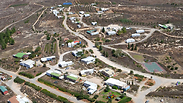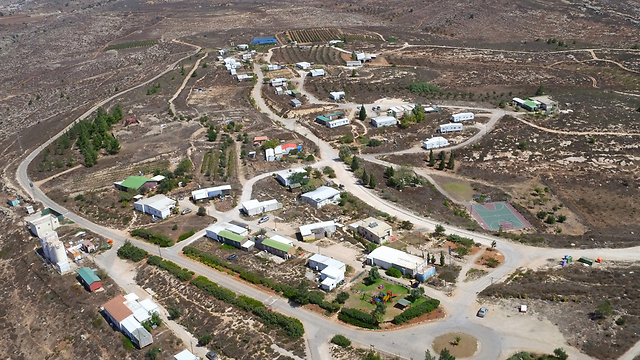

High Court rejects government's request to postpone Amona evacuation
While government is trying to pass legislation that would legalize outposts in the West Bank, including Amona, court refuses to grant what it dubbed a 'last minute' request to extend the deadline, set for December; Herzog causes outrage after calling outpost settlers 'a virus.'
The High Court of Justice on Monday rejected a request submitted by the government to extend the deadline for the evacuation of the illegal outpost of Amona.
"In this case, as in other cases in the past, we were asked to extend the deadline set in the ruling for the evacuation at the last minute. We can see that any time frame given, as long as it may be, would not be enough," Supreme Court judge Miriam Naor wrote in the court's ruling. "We must be careful; otherwise deadlines set by the court will become a recommendation."
"The state's request, which is based mostly on considerations that have already been 'taken into consideration' in the original ruling, constitutes in effect an attempt to change the decision made. This we cannot accept," Naor added.
In December 2014, then-Supreme Court President Asher Grunis ruled that homes built in Amona were constructed on private Palestinian land, and shall be demolished within two years, with the evacuation date set for December 25, 2016. The state requested last month to postpone the evacuation to allow time to examine alternative solutions for its residents.
In its petition, the state claims it is seeking to carry out the evacuation peacefully and without incident, but that it is unable to provide alternative living solutions for residents within the next two months. The state emphasized that if the court rejects the request, it will be prepared to carry out the evacuation by the date set in its ruling.
In the court's ruling which rejected the petition, Judge Naor noted that "we must also not ignore the possible repercussions of not carrying out this verdict in such circumstances. The message it would convey is that it is possible to prevent the implementation of verdicts because the state's concern of threats and violence, a message that cannot be accepted in a law-abiding nation."
The High Court ruling cited other similar cases—of Migron, the biggest illegal outpost in the West Bank, and of the Ulpana Hill, a neighborhood in the settlement of Beit El—both of which received much shorter evacuation deadlines—eight months and a year, respectively.
"Furthermore," Naor wrote, "the long time frame given to this evacuation was not made in a void. It reflects past experience, which taught us the government is not quick to carry out rulings ordering the evacuation of illegal construction in Judea and Samaria, and that it more than once failed to meet the deadline set."

Naor noted that she remains unconvinced that "extending the deadline will bring to an agreed resolution of the matter. It appears an approval of the request will only be used as an opening to submit additional extension requests, with the claim 'we didn't have enough time.' Such a result will render the ruling worthless and cannot be accepted. Even though we do not dismiss the consideration of a peaceful resolution, this consideration is not the most important thing."
Prime Minister Benjamin Netanyahu addressed the Amona situation at the Likud party meeting on Monday, but refused to comment on the High Court's decision. "We are aware of the distress of Amona's residents and are acting in different manners to resolve the problem," he said.
One of those ways is by pushing the so-called "regulation bill," which seeks to retroactively legalize any Jewish structures built on privately-owned Palestinian lands—as long as they were built with no intention of breaking the law—while offering generous compensation to those who prove they are the lands' owners. So far, attempts to legalize their status have not borne fruit.
Attorney General Avichai Mandelblit has criticized the law as "unconstitutional." Despite this, it was approved on Sunday by the Ministerial Committee for Legislation and will be raised at the Knesset for a preliminary reading on Wednesday.
In its ruling on Monday, the High Court noted that the decision to reject the government's request to extend the deadline for Amona's evacuation was not affected by the Ministerial Committee's approval of the so-called "regulation bill."
Settlers are 'a virus'
Earlier in the day, opposition leader Isaac Herzog (Zionist Union) raised the ire of Prime Minister Netanyahu when he called Jewish settlers living in illegal outposts in the West Bank "a virus that drags Israel to approve laws (that legalize) theft."
Speaking to Army Radio on Monday morning, Herzog expressed his concern that the "regulation bill" would be made into law.
"While I understand the families' pain, they were given two years to evacuate," Herzog said. "And look what this virus is doing to the State of Israel. Look how dangerous it is to our democracy and (look at) the fact we need to sacrifice lives over this nonsense."
The opposition leader asserted that "This would be a serious stain on the Israeli law book, as it's a law that legitimizes theft. It's unheard of that a government approves a law that allows taking away the rights of private individuals. Israel is not allowed to act against the law."
Prime Minister Netanyahu took to social media to express his outrage at Herzog's comments. "I can't believe Herzog used the term 'virus' in relation to settlers. They are our own flesh and blood, they serve in the IDF, and they contribute to the country. Buji, apologize immediately," Netanyahu wrote, using Herzog's nickname.
Herzog responded to Netanyahu with his own post on social media, using the prime minister's nickname: "No, Bibi, this time it won't work. The 'regulation bill' is the virus. A virus that is dangerous to the Israeli democracy and justice system. The settlers are my brothers. My own flesh and blood. And I'll take care of them more than you lie to them."

















